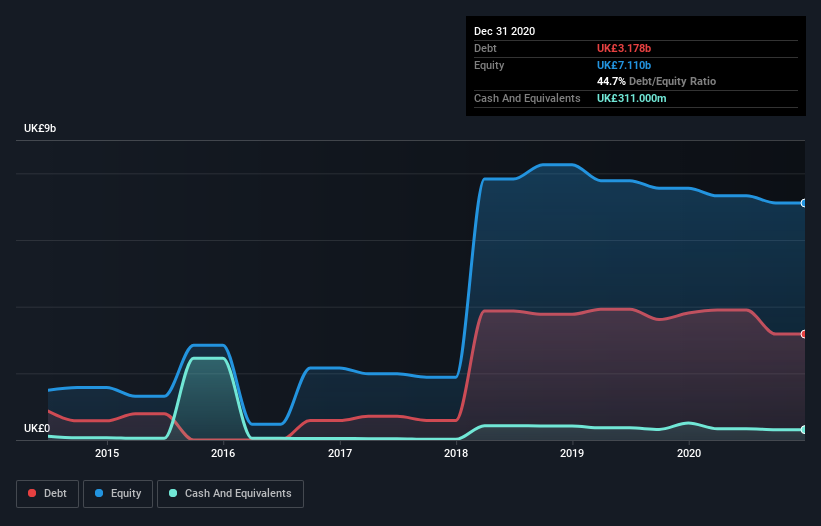Stock Analysis
- United Kingdom
- /
- Aerospace & Defense
- /
- LSE:MRO
Is Melrose Industries (LON:MRO) Using Debt In A Risky Way?

Warren Buffett famously said, 'Volatility is far from synonymous with risk.' When we think about how risky a company is, we always like to look at its use of debt, since debt overload can lead to ruin. As with many other companies Melrose Industries PLC (LON:MRO) makes use of debt. But the real question is whether this debt is making the company risky.
What Risk Does Debt Bring?
Generally speaking, debt only becomes a real problem when a company can't easily pay it off, either by raising capital or with its own cash flow. Part and parcel of capitalism is the process of 'creative destruction' where failed businesses are mercilessly liquidated by their bankers. However, a more common (but still painful) scenario is that it has to raise new equity capital at a low price, thus permanently diluting shareholders. Of course, debt can be an important tool in businesses, particularly capital heavy businesses. The first thing to do when considering how much debt a business uses is to look at its cash and debt together.
Check out our latest analysis for Melrose Industries
How Much Debt Does Melrose Industries Carry?
You can click the graphic below for the historical numbers, but it shows that Melrose Industries had UK£3.18b of debt in December 2020, down from UK£3.81b, one year before. On the flip side, it has UK£311.0m in cash leading to net debt of about UK£2.87b.

How Strong Is Melrose Industries' Balance Sheet?
Zooming in on the latest balance sheet data, we can see that Melrose Industries had liabilities of UK£3.36b due within 12 months and liabilities of UK£6.21b due beyond that. Offsetting this, it had UK£311.0m in cash and UK£1.63b in receivables that were due within 12 months. So it has liabilities totalling UK£7.63b more than its cash and near-term receivables, combined.
Given this deficit is actually higher than the company's massive market capitalization of UK£7.63b, we think shareholders really should watch Melrose Industries's debt levels, like a parent watching their child ride a bike for the first time. Hypothetically, extremely heavy dilution would be required if the company were forced to pay down its liabilities by raising capital at the current share price. There's no doubt that we learn most about debt from the balance sheet. But ultimately the future profitability of the business will decide if Melrose Industries can strengthen its balance sheet over time. So if you're focused on the future you can check out this free report showing analyst profit forecasts.
In the last year Melrose Industries had a loss before interest and tax, and actually shrunk its revenue by 20%, to UK£8.8b. We would much prefer see growth.
Caveat Emptor
Not only did Melrose Industries's revenue slip over the last twelve months, but it also produced negative earnings before interest and tax (EBIT). To be specific the EBIT loss came in at UK£278m. When we look at that alongside the significant liabilities, we're not particularly confident about the company. We'd want to see some strong near-term improvements before getting too interested in the stock. For example, we would not want to see a repeat of last year's loss of UK£526m. And until that time we think this is a risky stock. For riskier companies like Melrose Industries I always like to keep an eye on whether insiders are buying or selling. So click here if you want to find out for yourself.
When all is said and done, sometimes its easier to focus on companies that don't even need debt. Readers can access a list of growth stocks with zero net debt 100% free, right now.
When trading Melrose Industries or any other investment, use the platform considered by many to be the Professional's Gateway to the Worlds Market, Interactive Brokers. You get the lowest-cost* trading on stocks, options, futures, forex, bonds and funds worldwide from a single integrated account. Promoted
Valuation is complex, but we're helping make it simple.
Find out whether Melrose Industries is potentially over or undervalued by checking out our comprehensive analysis, which includes fair value estimates, risks and warnings, dividends, insider transactions and financial health.
View the Free AnalysisThis article by Simply Wall St is general in nature. It does not constitute a recommendation to buy or sell any stock, and does not take account of your objectives, or your financial situation. We aim to bring you long-term focused analysis driven by fundamental data. Note that our analysis may not factor in the latest price-sensitive company announcements or qualitative material. Simply Wall St has no position in any stocks mentioned.
*Interactive Brokers Rated Lowest Cost Broker by StockBrokers.com Annual Online Review 2020
Have feedback on this article? Concerned about the content? Get in touch with us directly. Alternatively, email editorial-team (at) simplywallst.com.
About LSE:MRO
Melrose Industries
Provides aerospace components and systems to civil and defence markets in the United Kingdom, rest of Europe, North America, and internationally.
Reasonable growth potential and fair value.

